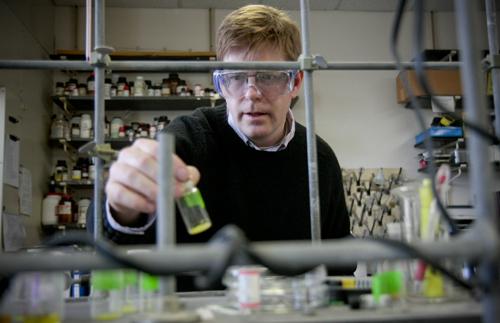
This post was written by Hatchet staff writer Aliya Karim.
When Douglas Shaw joined policy experts and heads of state at the Next Generation Nuclear Security Summit two years ago, he wanted to know how universities could help strengthen nuclear security.
He got his answer from MacArthur Foundation President Robert Gallucci, who spoke at the event.
“He said we need to have science education for the policy community and the general public. That’s the most important thing higher education can do,” Shaw, associate dean for planning, research and external relations in the Elliott School of International Affairs, said.
Now, Shaw and three Columbian College of Arts and Sciences professors are developing a nuclear science course for “non-science people” after receiving a $300,000-grant from the U.S. Nuclear Regulatory Commission last fall. The latest steps in their course preparation include lining up guest speakers and choosing lab material.
The graduate-level course, which rolls out next semester, will primarily target professionals already working in nuclear policy. Chemistry and international affairs professor Chris Cahill and physics professors William Briscoe and Gerald Feldman are strategizing this semester about how to make the field accessible.
“There is a gap between scientific experts and policy experts,” Cahill said. “These days, policy dictates everything, but policy people don’t understand the science and science people don’t understand the policy.”
Shaw, a nuclear nonproliferation expert who was trained in security studies, adds to the course’s collaboration between science and international affairs – a collaboration he says has real world implications.
To close this gap, the professors, who also collaborate at GW’s Institute for Nuclear Studies, will balance equal-parts lab and lecture to teach the science behind the policy.
“It’s useful for [policymakers] to know this information, and some would argue that it should be necessary, that they really need to know this stuff in order to have a conversation,” Feldman said. “We want to bring them up to speed.”
Although only graduate students and working professionals will initially take the one-semester course, it may become a yearlong course open to undergraduates as the curriculum develops. The course is pending approval for cross-listing between the Columbian College and the Elliott School.
The curriculum will focus on nuclear safeguards and security, health and the environment, the nuclear fuel cycle and proliferation issues.
“GW is a unique educational institution to execute a project like this because of the expertise of nuclear science and policy under one roof,” Cahill said. “It really makes this a current and relevant curriculum.”




